The Imperative of Information Literacy in the Digital Age: Challenges and Solutions
Keywords:
Information Literacy, Digital Information Platforms, Information Literacy Education, Information Literacy Policy, Information Literacy Strategies.Abstract
In the rapidly evolving digital landscape, the ability to critically evaluate, manage, and utilise
information effectively including an understanding of the ethical issues related to information
has become an essential skill. This paper,through the review of literature, discusses the growing
importance of information literacy in the digital age, emphasising its role in enabling
individuals to navigate the overwhelming abundance of online content effectively. The paper
discusses several important issues, such as the critical role of information in fostering
interaction due to the increased information flows between parties, both individuals and
organisations, the abundant information choices, the direct correlation between a country's
information wealth and its material prosperity and the long term effect of information on society
and the economy.It discusses the growth of the digital platforms,its role in facilitating so many
of our everyday tasks,the inability to guarantee the reliability, accuracy, or quality of
information found online, its pervasive role in the transmission of false information and the
inadequacy of AI systems.It discusses the concept of information literacy, its importance in
preparing people for lifelong learning and a democratic society; its role in promoting economic
growth, education, health, and human services, among other facets of modern societies, andits
contribution to the competitive advantage of individuals, businesses, regions and countries. The
paper also discusses the role of education in inculcating information literacy, the need for its
inclusion in the curriculum, and for collaboration among the stakeholders. It discusses the
challenges and the strategies for promoting information literacy,the need for institutions,
government agencies and organisations to create policies that incorporate and encourage
information literacy, offering support through provision of facilities and supportive
environment, and stressing the value of information literacy while specifying methods to be
employed in teaching and engaging students. By addressing these issues, the author hopes to
promote digital fairness, strengthen the information society, and enable people and communities
to make wise decisions. In order to guarantee ethical and sustainable use of the digital world,
this paper emphasises how vital it is to incorporate information literacy into the educational
systems.

